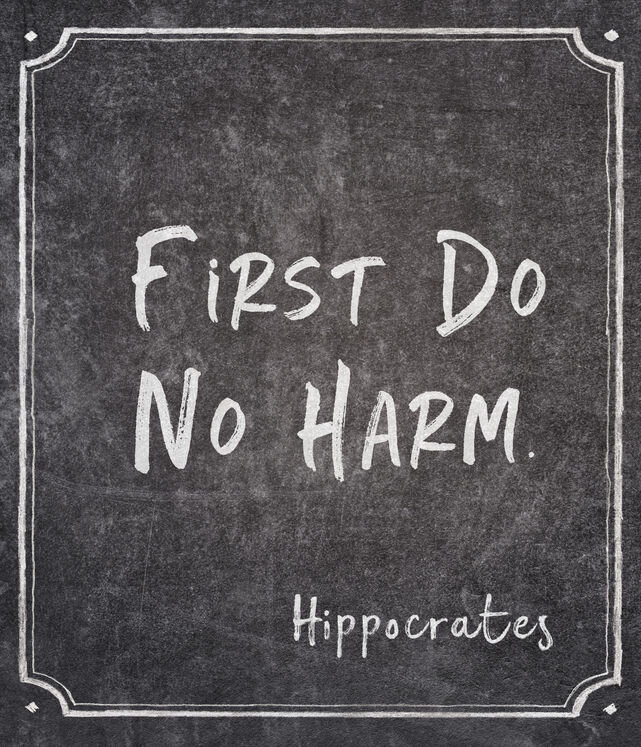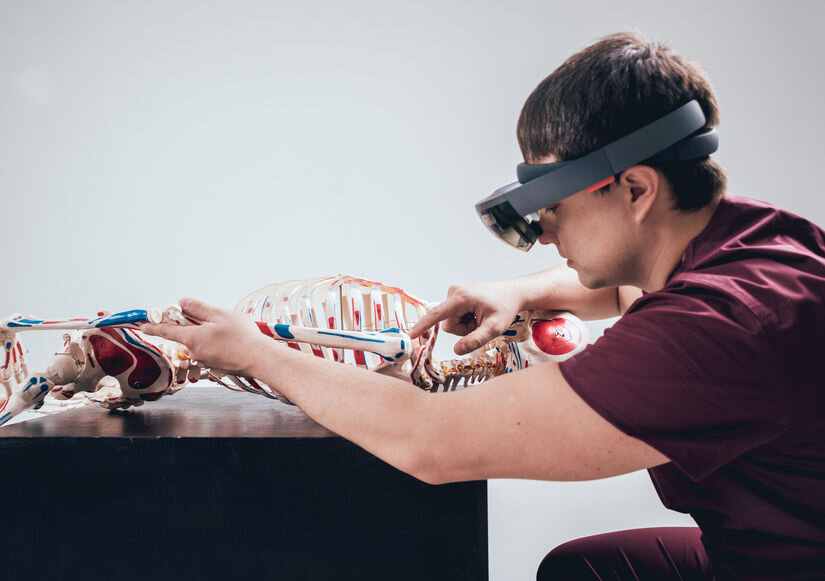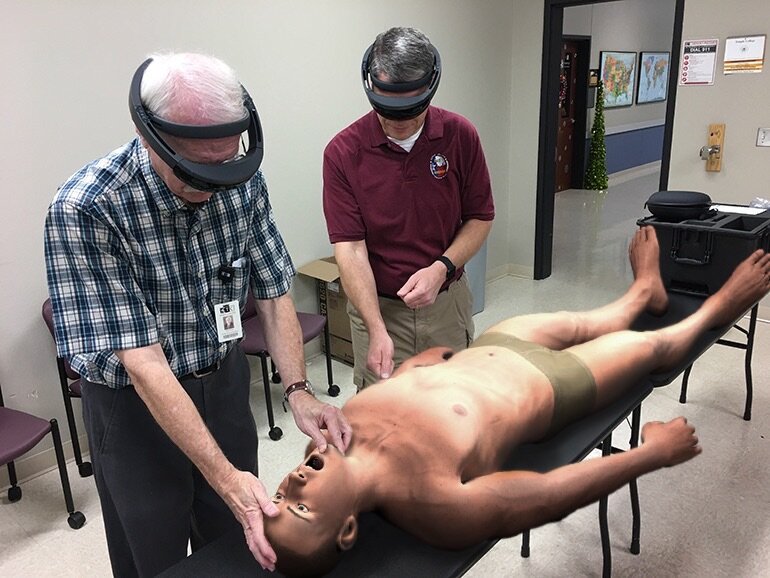How MedCognition is Making Clinical Training More Intuitive with PerSim, a Holographic Augmented-Reality Patient Assessment System
There is a phenomenon in healthcare that pre-existed the COVID-19 pandemic but may be more pressing than ever after training institutions shuttered for nearly a year in 2020. Emerging from a global public health crisis, healthcare institutions’ use of medical simulation has grown as a tool to help bridge the gap in workforce preparedness. Augmented reality is a technology finding its way to the fore of solving the paradox of medical training.

The Paradox of Medical Training
There is a paradox to training healthcare professionals that we rarely mention. It is hidden away from the unknowing world or trusting patients looking for relief from what plagues them. Health professions students spend months and even years learning and preparing to care for patients, yet most are not ready to do the job employers hired them to do on the first day of work. Think back to your first day. Did you feel ready?
The first year after medical school is called an internship. It’s an ornate title for a newbie. On my first day of being an Intern, the paradox of medical training struck me.
On day one, you have all the responsibility and none of the authority. It seems, no matter what position you hold in healthcare, you have zero street cred on the first day after your training.
Everyone, including you, knows that you have little experience or practice making clinical decisions. You have the potential to do lots of good. Unfortunately, you also have the potential to harm.
Experienced bedside pros, like nurses, know that Interns and other newbies can inadvertently harm patients. One of their many roles is to make sure freshly minted doctors do the right thing.
As a newbie your main goal is ‘First, Do No Harm’. Ironically, twenty years from now, that will still be your goal. And in twenty years, it will still be the job of seasoned nurses to make sure physician interns don’t do something stupid and harm patients.

Primum Non-Nocere?
But wait, ‘First, Do No Harm’?
It seems to be a strange prime directive for medicine. Aren’t we in the business of doing good?
Of course, you help people in medicine, and sometimes you even save lives. And yet, the prime directive: ‘primum non nocere’ does imply that something more is at stake.
The truth is you can and, at times, do harm patients.
You don’t mean to, but it does happen.
You face another complicated truth. Little about medical training and education has changed the harm patients experience.
You have all seen the eye-popping statistics. Decades after the Institute of Medicine’s landmark report To Err is Human, medical error and patient safety remain a significant challenge.
Unfortunately, today it is a bigger problem. Medical error is the third leading cause of patient death.
That’s one of the driving reasons why we started MedCognition and developed PerSim®, our holographic patient simulation system.
Less than a handful of years ago, we set out to transform medical simulation training by creating an intuitive clinical experience. We wanted you to have an experience that allows you to see a sim patient in your environment, experiencing real-world problems and pain in real-time—no more pretending what color your sim patient’s skin might be turning. PerSim allows you to see these clinical states as they happen and they change dynamically.

Under Leveraged Medical Simulation
Nothing beats the learning you get from taking care of real patients. Unfortunately, access to actual patients has become scarce, and training for common patient presentations has become nearly as challenging as preparing for low frequency, high-risk cases.
Medical simulation has emerged as a critical tool transforming novice students into skilled clinicians. But we found that something was missing.
Replicating a clinical encounter in medical simulation often involves the overuse of verbal cueing, confusing replicas of human patients, and underuse of basic skills such as observation and critical thinking.
PerSim replicates complex disease conditions that are otherwise impossible to create in real-time and on-demand situations with mannequins, other AR systems, or even VR systems.
For example, in respiratory distress simulations, the healthcare simulator slowly increases the respiratory rate. It engages accessory muscles realistically to demonstrate an increased effort to breathe, and the instructor can modify the sim patient’s condition based on the trainee’s management choices.
Trainees are challenged to use critical thinking skills and exercise the art of rapid visual assessment to determine PerSim’s condition. Making decisions in a ‘safe to fail’ environment repeatedly and using a tool that sharpens a trainee’s clinical skills of assessment is at the heart of medically intuitive simulation training.

Clinical Decision Making
While most medical simulation companies tackle fidelity and realism, MedCognition chose to use our background working the frontlines of healthcare to think about how clinical decisions are made. We asked ourselves a simple question, ‘How could we teach trainees to understand their clinical decision-making better?’
Awareness and understanding of one’s thought process is called metacognition. And in fact, our company’s name plays on the term medical metacognition, hence MedCognition. Our premise is better clinical decision-making reduces medical error and saves more lives. But, how do you teach someone to make better clinical decisions?
The simple answer: Make Clinical Training Intuitive. Intuitive clinical training makes learning to care for patients easier, safer, and more time-efficient.
More about MedCognition
Founded in 2016, MedCognition is a Texas-based medical simulation education training company developed by emergency medicine clinicians, educators, and computer scientists through a partnership with the University of Texas Health San Antonio and the University of Texas at San Antonio. The mission of MedCognition is to help frontline healthcare workers reduce medical errors and save more lives by providing intuitive medical simulation both in the classroom and in the clinical workspace.
The company’s AR training platform, PerSim, is the first-of-its-kind patient simulator specifically designed to help medical providers enhance critical thinking and mitigate potential mistakes. By leveraging the latest AR and holographic technology, PerSim represents a leap forward, allowing medical professionals to train for those vital times when performing their best makes a difference. The company’s founders include a nationally-known speaker on cognitive errors in emergency medicine, nationally recognized emergency medicine educators, U.S. Army combat veterans, and an internationally recognized expert in AR technology.
Learn More About PerSim by MedCognition




